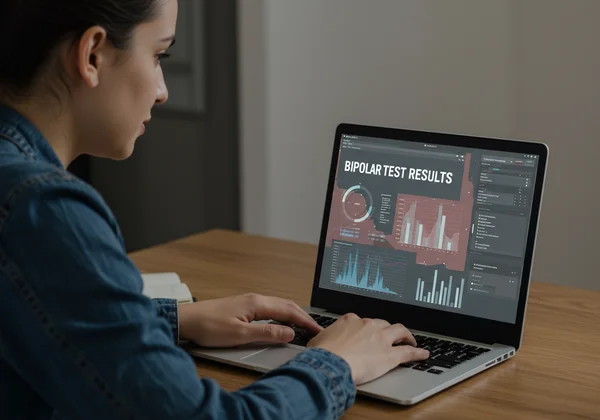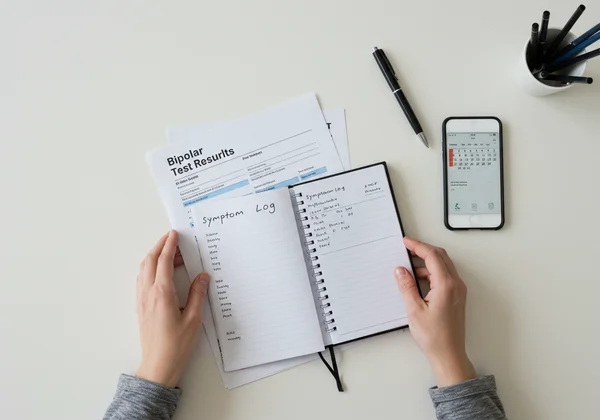Discussing Bipolar Test Results: Your First Doctor's Visit
October 27, 2025 | By Felicity Hayes
Taking an online bipolar test can be a significant and often emotional first step. You might feel a sense of relief, validation, or perhaps a wave of anxiety about what comes next. It’s completely normal to feel a mix of everything. The most important thing to remember is that you've just empowered yourself with valuable insight. How can I test if I am bipolar and use that information productively? This guide is designed to help you turn your test results into a confident, constructive conversation with a healthcare professional. Taking this step is not about seeking a label, but about finding clarity and a path toward feeling better.
The results from a screening tool are a starting point, a way to organize your thoughts and experiences. To truly understand your mental health, a professional evaluation is essential. If you haven't already, you can get initial insights on our homepage.

Preparing for Your Bipolar Discussion with a Doctor
Walking into a doctor's office prepared can make all the difference. It transforms a potentially stressful encounter into a collaborative meeting where you are an active participant in your own healthcare. Good preparation ensures you don’t forget crucial details and helps your doctor get the clearest possible picture of your experiences.
Gathering Your Bipolar Test Results and Symptom Log
Doctors work with information. The more organized and specific you can be, the better they can help you. Simply saying "I have mood swings" is less helpful than providing concrete examples. This is where your test results shine.
-
Print Your Results: Bring a copy of your results from the online bipolar test. If you opted for the AI-powered personalized report from our site, it provides an even more detailed summary of your mood patterns, challenges, and strengths. This document serves as excellent bipolar assessment notes.
-
Start a Symptom Log: For a week or two before your appointment, keep a simple daily journal. Note your mood (e.g., on a scale of 1-10), energy levels, sleep patterns, and any significant behaviors or feelings. Did you have a day of incredible productivity followed by a crash? Did you feel unusually irritable or euphoric? This kind of symptom tracking provides invaluable real-world data.

Essential Questions to Ask Your Doctor About Bipolar Disorder
Your appointment is a two-way conversation. Having questions ready shows you are engaged and helps you get the information you need to make informed decisions. Consider writing these down so you don’t forget them in the moment.
Here are some bipolar diagnosis questions to consider:
- Based on what I've shared, what are the possible explanations for my symptoms?
- What is your process for diagnosing something like bipolar disorder? What does it involve?
- Are there any other medical conditions or factors that could be causing these symptoms?
- What is the difference between bipolar I, bipolar II, and other mood disorders?
- If I am diagnosed, what are the typical next steps for treatment and management?
- Can you recommend any resources, like books or support groups, for me to learn more?
Should You Bring a Support Person to Your Appointment?
Deciding whether to bring a friend, partner, or family member is a personal choice. A support person doctor visit can be incredibly beneficial. They can offer emotional support, help you remember what the doctor says, and even share their own observations of your moods and behaviors (with your permission, of course). If you often feel overwhelmed in medical settings or worry you might downplay your symptoms, having a trusted advocate by your side can be a source of strength and clarity. Choose someone you trust to be calm, supportive, and respectful of your privacy.
Navigating Your Bipolar Diagnosis Appointment
You’ve done the preparation, and now it’s time for the appointment itself. The goal is to have an open, honest dialogue. Remember, your doctor is there to help, not to judge. They have spoken with countless individuals about sensitive mental health concerns.
Effectively Communicating Your Experiences and Concerns
Being able to accurately describe your inner world is key. Try to be as specific as possible when describing bipolar symptoms. Instead of saying "I get depressed," you might say, "For two weeks last month, I couldn't get out of bed, felt completely worthless, and had no interest in things I usually love."
Similarly, for elevated moods, instead of "I have a lot of energy sometimes," try: "There are periods where I sleep only three hours a night but feel completely wired. During those times, I talk much faster than usual, my thoughts race, and I start multiple big projects I can't finish." This level of detail helps a clinician distinguish between normal mood variations and symptoms that indicate an underlying condition.
What to Expect During the Professional Assessment Process
A comprehensive mental health evaluation is rarely completed in a single 20-minute visit. The process is thorough to ensure an accurate diagnosis. Here are some of the mental health assessment steps you can generally expect:
-
Detailed Interview: Your doctor will ask about your personal and family medical history, your symptoms, their duration and severity, and how they impact your life.
-
Questionnaires: You may be asked to fill out standardized screening tools similar to the bipolar screening test you took online.
-
Ruling Out Other Causes: Your doctor may order blood tests or a physical exam to ensure your symptoms aren't caused by another medical issue, like a thyroid problem.
-
Multiple Appointments: It's common for a final diagnosis to take more than one session as the doctor gathers a complete picture of your mood patterns over time.

Understanding Potential Diagnoses and Initial Next Steps
After the assessment, your doctor will discuss their findings. There are several possible outcomes. You might receive a diagnosis of bipolar disorder, or the doctor might identify another condition like major depressive disorder, an anxiety disorder, or ADHD, which can sometimes be mistaken for bipolar. It’s also possible they may conclude you don't meet the criteria for a formal diagnosis but can still offer strategies for managing mood swings.
Whatever the outcome, receiving bipolar diagnosis guidance is not an endpoint; it's the beginning of a plan. This plan might include therapy, medication, lifestyle adjustments, or a combination of all three.
After the Appointment: Taking Control of Your Mental Health Journey
Your role in managing your mental health continues long after you leave the doctor's office. True progress comes from ongoing partnership with your healthcare team and a commitment to your own well-being.
Self-Advocacy and Follow-Up Care for Bipolar Disorder
Becoming an expert on your own experiences is the heart of bipolar self-advocacy. Keep tracking your moods and symptoms to see how they respond to any treatment. If a treatment plan isn't working or has difficult side effects, communicate this clearly to your doctor. Don’t be afraid to ask for a second opinion if you feel your concerns are not being heard. Consistent mental health follow up is crucial for finding the right balance and maintaining stability.
How Our AI-Personalized Report Supports Ongoing Insights
The optional AI-personalized report from our platform is more than just a pre-appointment tool. It can serve as a valuable baseline. As you begin treatment and learn new coping strategies, you can refer back to the report's insights about your unique patterns. It helps you measure progress and understand your journey on a deeper level. This data-driven self-awareness, combined with professional guidance, is a powerful combination for long-term wellness. Consider it your first step toward a more informed you, which you can always start on our site.
Your Next Steps Towards Understanding and Managing Bipolar Disorder
Taking an online bipolar test and preparing to see a doctor are acts of courage. You are taking a proactive step toward understanding your mind and improving your quality of life. Remember to be patient and compassionate with yourself throughout this process. Armed with organized information, thoughtful questions, and a commitment to self-advocacy, you can navigate this journey with confidence.
Your mental health is a vital part of your overall well-being. Continue seeking knowledge, building a support system, and working with professionals to find the path that is right for you. Your journey to clarity starts with a single, informed step, and you have already taken it. To review your symptoms in a structured way, feel free to use our free bipolar test at any time.
![]()
Frequently Asked Questions About Bipolar Diagnosis Appointments
How do you get tested for bipolar disorder professionally?
A professional diagnosis is made by a qualified healthcare provider, such as a psychiatrist or psychologist. It involves a comprehensive clinical interview about your symptoms and history, standardized assessment questionnaires, and sometimes a physical exam to rule out other medical causes. There is no single blood test or brain scan for bipolar disorder; diagnosis is based on your reported experiences and observed behavior patterns over time.
What is commonly mistaken for bipolar disorder during diagnosis?
Several conditions share symptoms with bipolar disorder, which can make diagnosis complex. These include Major Depressive Disorder (especially if hypomanic episodes are missed), Borderline Personality Disorder (BPD), which also involves mood instability, Attention-Deficit/Hyperactivity Disorder (ADHD), which shares symptoms like impulsivity and racing thoughts, and certain anxiety disorders. A thorough evaluation is key to differentiating these conditions.
What is the difference between Bipolar I and Bipolar II during assessment?
The primary difference lies in the severity of the "high" moods. To be diagnosed with Bipolar I, a person must have experienced at least one full manic episode—a period of abnormally elevated energy and mood lasting at least a week that causes significant impairment in life. For Bipolar II, a person must have experienced at least one hypomanic episode (a less severe and shorter version of mania) and at least one major depressive episode. An online bipolar symptoms test can help you identify experiences that align with either pattern.
What should I do if I disagree with my doctor's assessment?
If you feel that your doctor's assessment doesn't fully capture your experience, it is perfectly acceptable to seek a second opinion. You are the expert on your own life. You can express your concerns to your current doctor, explaining why you feel the diagnosis might be inaccurate, and continue to track your symptoms meticulously. Seeking another evaluation from a different specialist can provide new perspectives and ensure you find a diagnosis and treatment plan that truly fits your needs.
Disclaimer: This content is for informational purposes only and does not constitute medical advice, diagnosis, or treatment. Always seek the advice of your physician or another qualified health provider with any questions you may have regarding a medical condition.